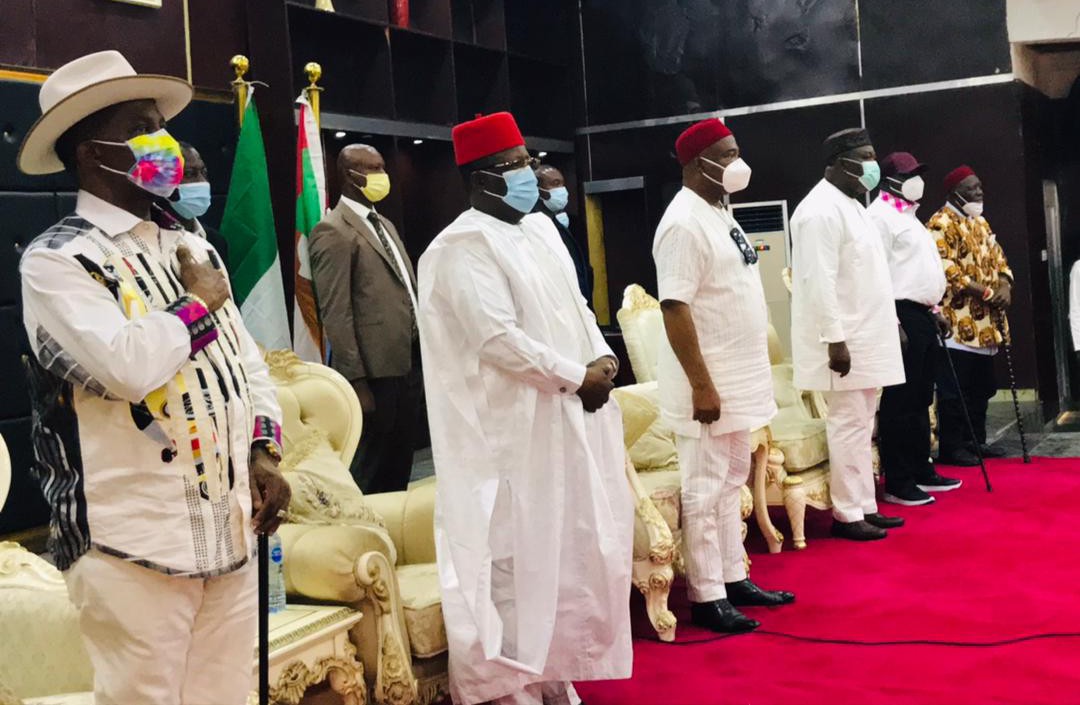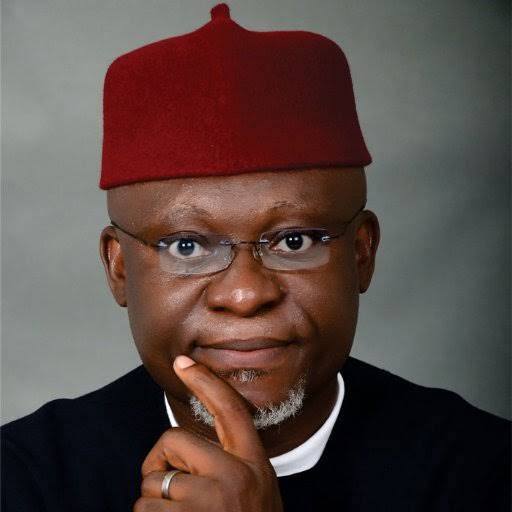Headlines
Buratai’s ‘threat’ to declare state of emergency in South East Nigeria, a reply

By Bob Okey Okoroji Esq
I was irked by the threat reportedly issued by Gen Tukur Burutai, the Nigerian Chief of Army staff, to impose state of emergency on the South East “if security forces are attacked.” It is one of the most arrogant, ignorant, contemptuous, frivolous and irresponsible comments ever made by any serving chief of army staff in this country in total disregard for the rule of law with far reaching national security implications.
In the entire constitutional history of Nigeria, the declarations of a state of emergency have always been grounded on actual public order concerns and safety and security concerns and not on an imaginary, speculative and futuristic threat to public order as Burutai’s statement tends to suggest. In his earnest quest to usurp and arrogate to himself the constitutional powers of President of Nigeria, Burutai inadvertently has revealed his inordinate ambition to illegally hijack and seize Presidential powers, or even assume the responsibilities of President Muhammadu Buhari. Buhari had better carefully watch him.
In this piece, I will critically examine and X-ray the relevant provisions of the 1999 Constitution, statutes, and relevant historical precedents and antecedents in our constitutional history with a view to bringing to the fore the actual meaning and intendment of *state of emergency* as provided in the constitution, the legal procedures for its declaration, and the circumstances that can warrant the imposition of state of emergency in Nigeria or any part of it thereof which piece of knowledge Mr Buratai appears to be totally ignorant of.
MEANING OF STATE OF EMERGENCY
The 1999 Constitution does not expressly define ‘ state of emergency ‘ but the meaning of the term can be easily be gleaned from the joint or combined reading of the sections 305 and 45 (3) of the constitution. The term is defined in the 20th Century Chambers dictionary of English as “The suspension of normal law and order procedures and the introduction of strict controls of the population that usually involves the military, so that a crisis, a revolution etc can be contained.” Section 45(3) of the Nigerian 1999 Constitution, however defines a period of emergency as “any period during which there is in force a proclamation of a state of emergency declared by the President in the exercise of the powers conferred on him under section 305 of the constitution,” and during such period, “…certain fundamental rights of citizens as enshrined under chapter IV of the constitution, may of course be derogated from or limited” as provided for under section 45(2) of the constitution.
In section 305, the constitution unequivocally states the procedure for declaration of the state of emergency, who may declare it, the circumstances and conditions that will warrant such a declaration, when it will cease to have effect, and the respective roles of the National Assembly, state governors, and a state legislative house in the process.
CONDITIONS THAT MUST EXIST BEFORE THE DECLARATION OF STATE OF EMERGENCY
Let me make haste to state that under our law, the power to declare State of Emergency in Nigeria or any part thereof lies, not with the chief of army staff or anyone else for that matter, appointed or elected, the power lies exclusively with President of the Federation subject to National Assembly 2/3 majority approval. Certainly not with a mere chief of army staff by his own military fiat through the media.
Section 305(3) states clearly that the proclamation of emergency “SHALL BE MADE BY THE PRESIDENT” under the following conditions, when:
(a) Nigeria is at war
(Nigeria is in imminent danger of invasion or involvement in a state of war.
(c)There is actual breakdown of public order and public safety in the federation or any part thereof that require extraordinary measures to restore peace and security.
(d) There is a clear and present danger of an actual breakdown of public order and public safety in the federation or any part thereof requiring extraordinary to avert such danger.
(e) There is an occurrence of imminent danger, or disaster or natural calamity, affecting the community or a section of the community in the federation
(f) There is any other public danger which clearly constitutes a threat to the existence of the federation or
(g) The President receives a request to do so in accordance with the provisions of subsection (4) of the section 305 of the 1999 Constitution
Having stated that chief of army has no the legal powers to declare a state of emergency on Nigeria or any part thereof, suffice it to say that it is only the president of the federation that is empowered by the constitution to declare or impose a state of emergency and he can only lawfully do so by issuing a proclamation in an instrument published in the official Gazette of the government of the federation, on the federation or any part thereof as provided under section 305 (1).
In section 305(2) the constitution says the President SHALL immediately after the publication transmit copies of the official Gazette containing the proclamation “including the details of the emergency” to the president of the Senate and speaker of house of representative, each of which shall forthwith convene or arrange a meeting of their respective Chambers of the National Assembly to consider the situation and decide whether or not to pass a resolution approving the proclamation. Such has to be by the support of 2/3 majority of members of each chambers of the National Assembly.
Again the President may issue a proclamation a state of emergency upon a request of state governor who of course, has to have the support of 2/3 support of the State Assembly where there is in existence any situations specified under section 305 (3) (e-g) provided the bad situation of danger to public order or safety does not go beyond that state’s boundaries.
HISTORICAL ANTECEDENTS
Nigerians would recall that the first time in our constitutional history that a state of emergency was declared was in May, 1962 under Prime Minister Alhaji Abubakar Tafawa Balewa, pursuant to section 65 of the then 1960 constitution during which period Balewa appointed Dr Majekodunmi as sole administrator of Western Region. However, Nigerians would recall that Balewa was quick to emphasize that his decision was made “Solely by the desire to ensure that peace order and tranquility are maintained throughout the parts of the federation.”
It is a far cry from Buratai’s ‘if situation’, neither was is based on speculations about future threats to peace. Nigerians would also recall that under President Olusegun Obasanjo’s civilian administration, there were real and actual dangers and threats to peace that necessitated the President’s declaration of state of emergency on Plateau and Ekiti states and the appointment of Chris Ali and Adetunji Olurin respectively as sole administrators in those two states.
Interestingly, under President Goodluck Jonathan, he declared a state of emergency in Adamawa, Borno and Yobe states among others as a result of the wanton killings, and destruction of properties by Boko Haram terrorists who had even occupied and established control and authority over a chunk of or many parts of Nigerian territory, challenging Nigerian sovereignty by so doing.
Those kinds of situations do not exist in the South East today. Therefore, nothing warrants the reckless and speculative statement of Mr Buratai, a mere appointee of the President of Nigeria. It is noteworthy that Jonathan’s government in its characteristic humane approach did not even remove state political structures during the emergency period unlike the two governments of Balewa and Obasanjo.
CONCLUSION
Arising from the foregoing constitutional provisions and historical antecedents, it is crystal clear who has the exclusive authority under our law to declare a state of emergency in Nigeria or any part thereof and under what circumstances and conditions it may be declared. The point must be underscored that under the current constitution, it is President of the Federation and not Chief of Army staff that has power and authority to declaration a state of emergency which he cannot even do without the express approval of 2/3 of National Assembly. So the Presidential proclamation must still be subjected to the ultimate approval of the National Assembly for the declaration to be lawful and valid.
Therefore, the reported statement of the Chief of Army Staff, Mr Buratai about his plan to impose a state of emergency in South East geopolitical zone, is unwarranted. It is a mere talk, at best a mere speculative statement of intent to carry out an unlawful action which he has neither the authority, justification nor power to carry out. South East remains one of the most peace regions in Nigeria, thereby making Buratai’s arrogant comment and blatant show of brute force against unarmed civilians additional muddy smear on the Buhari’s and APC’s ugly public image and abysmal human rights records. Buratai has become a liability not an asset to this government. His records of alleged corruption, resource mismanagement, professional hollowness and incompetence cry to high heavens.
Talking about Burutai as a person, you would notice that this is a Chief of Army staff that has yet to win any the war against the insurgent, and who has not won a war in his entire military career in spite of the humongous resources put at his disposal. He hasn’t been able to defeat the ragtag militia in the North East.
The South East is and remains one of most peaceful regions in the country, yet it is the most militarized, possibly on the advice of Buratai and his ilk. Buratai, it appears, holds the South East in contempt and condescension as he often seeks to intimidate and wage unnecessary psychological war against the governments and people of the zone, including those of the South South, because to him the two regions appear to be soft targets. Of course, terror groups, too, everywhere in the world attack and threaten soft targets.
Bob Okoroji, a Constitutional Rights Lawyer, wrote from Lagos.










